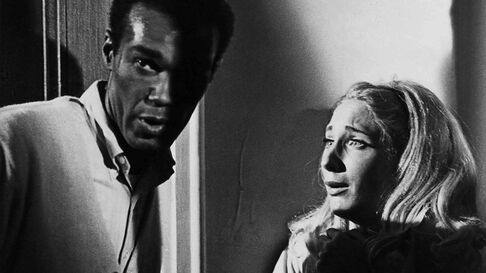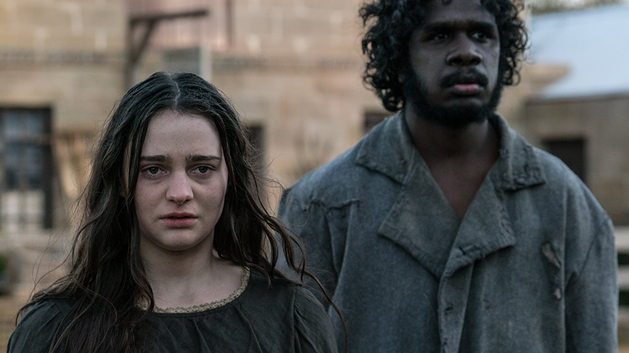 Jennifer Kent’s The Nightingale, her sophomore feature following 2015’s The Babadook, is not a fun film. It is brutal, heavy, and uncomfortable; a long film steeped in relentless gloom. It’s designed to make the viewer angry, even rageful. This won’t sit well with everyone, and has been the source of much controversy since making the rounds on the festival circuit, not to mention stories of audiences walking out or people fainting at screenings... ...Though the plot is simple and the general narrative framework recognizable, the complicated and tragic history that the film addresses is truly what drives the story, and provides a context for the overpowering yet understandable cauldron of anger that threatens to spill out of the screen at any given moment. In 1825, Clare Carroll (Aisling Franciosi) is a convicted Irish felon sentenced to serve out her term on the British penal colony of Van Diemen's Land (present day Tasmania). Desperate for freedom, Clare has appealed her sentence many times and as the film opens she once again makes her case to officer Hawkins (Sam Claflin). He denies the appeal, claiming Clare belongs to him and for this reason alone, he will not ever let her leave. Ironically, Hawkins is making his own requests to his superiors in an effort to leave Van Diemen’s Land, where he has been stationed for two years longer than his initial posting. In this time, he has nearly eradicated the Aboriginal population. This isn’t enough for his superior, it seems, and Hawkins is humiliated in his refusal. This refusal begins a chain of events that involves some of the most disturbing and stomach-churning scenes and flashpoints in film history. As mentioned, the story here is the bleakest of bleak--a rape and revenge tale that plays out over the harsh Tasmanian landscape amidst the background of early nineteenth century British imperialism. It is a cold, barren, and colorless wilderness reflecting the tone and themes of the film, as well as the dark, oppressive history of the region. During the colonial occupation of Tasmania in the 19th century, conflict naturally erupted between the native peoples and the self-appointed British overlords. These skirmishes came to be called frontier wars but were in actuality massacres, with the British so savagely decimating the Aboriginal population that the only fitting word to describe what happened would be genocide. The cruel and severe imbalance of power that results in widespread physical and psychological suffering is the encapsulating theme of Kent’s unexpected, less tame follow-up to The Babadook. Not only does the film explore the conflict of power between colonizers and native groups, but between men and women, officers and foot soldiers, the untamed wild and an encroaching Western “civilization,” and between races. None of these topics are explored with hesitation or watered-down lenses, but instead with an unflinching tenacity that will unsettle even the most hardened of cinephiles. Long sequences of sexual assault are framed not as the shocking yet inevitable climax of narrative buildup but as stark windows into a historical truth that Kent will not let the world deny any longer. Every shot of The Nightingale is carefully staged, and Kent uses the camera as much as the story to illustrate the threads of abusive power, fraught dynamics, and societal tension that weave throughout the movie. It’s a fascinating film in that it eschews traditional storytelling norms, refusing to let characters like Billy (Baykali Ganambarr), Clare’s native guide that reluctantly helps her head north in pursuit of Hawkins, become a vessel for Western sympathy even as he recounts a childhood of trauma, abuse, abandonment, and forced assimilation. In a less realized film, Billy and Clare would become friends on their arduous trek to avenge Clare’s attack, but that would be disingenuous to Kent’s vision, and arguably to the history itself. As an Irish convict and a black native they are regarded as sub-human by the British, and what bonds them is not a mutual understanding of one another but a mutual hatred for the English. It’s not exactly a warm mantel on which to found the connection of the central pair, but it’s an honest one; and in terms of uncomfortable aspects of The Nightingale, it’s nowhere near the top of the list. Or even the middle, for that matter. Speaking of the middle, the film sags somewhat in the second act when the tight displaying of historical injustices must make room for the pressing concerns of the revenge arc, and there are some dream sequences that can seem to confound the point the film is trying to make. A subplot involving Hawkins and a belligerent comrade in his retinue could also have used some editing, but still provides fascinating insight into conflict and abusive power within the military. Even in middle portion, however, Kent doesn’t hold back on exposing the dark side of history and forcing the audience to confront several of the world’s harshest truths. No part of this movie is for the faint-hearted. The Nightingale is not for everyone. It is an intense often nauseating film full of violence and malice that is impossible to shy away from or forget. It is an exploration of female trauma and the impact of racially motivated colonialism on native peoples and in these ways it is one of the most terrifying horror films you can subject yourself to. It is a film that rejects simplicity and plays with genre, one that will startle and shock and trouble the viewer. It is a film that does not sugar coat or hide the injustices done against female and black bodies since time immemorial. Whether it succeeds in its mission of confronting these truths and sparking a contemporary dialogue without veering into exploitation is debatable, and perhaps must be left to the individual viewer. What’s not up for debate is that, if you can stomach it, this film is worth sitting through in the worst, best way possible. The Nightingale is now on VOD and streaming on Hulu through IFC Films. By Craig Ranallo
0 Comments
Leave a Reply. |
Archives
March 2023
|


 RSS Feed
RSS Feed